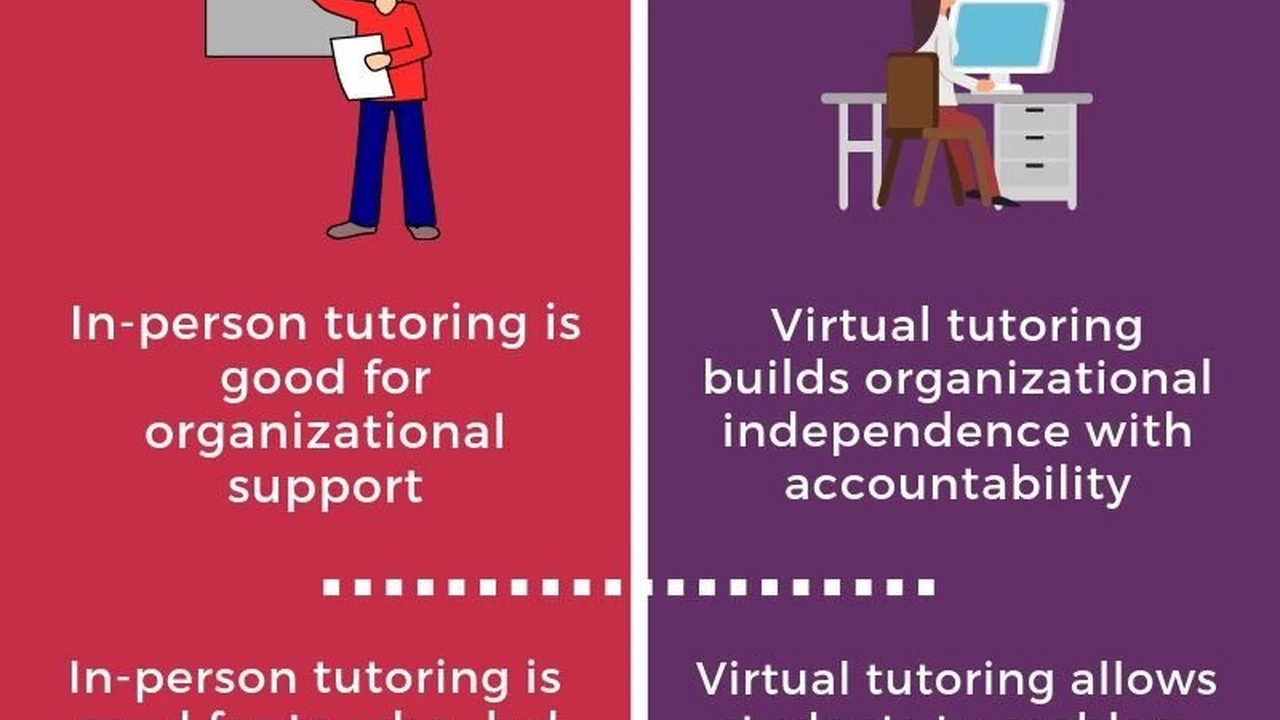Comparing Tutoring Services Online vs In Person
Decide between online and in-person tutoring services with our comparison. Find the best support for your academic challenges.

Comparing Tutoring Services Online vs In Person
Understanding Tutoring Options for Academic Support
When you're hitting a wall with a tough subject, or just want to get ahead, tutoring can be a game-changer. But with so many options out there, how do you pick the right one? It often boils down to two main types: online tutoring and in-person tutoring. Both have their perks and drawbacks, and what works best for one student might not be ideal for another. Let's dive deep into comparing these two approaches, looking at everything from flexibility and cost to the quality of interaction and specific product recommendations.Online Tutoring The Digital Classroom Experience
Online tutoring has really taken off, especially in recent years. It offers incredible flexibility and access to a wider pool of tutors. You can connect with an expert from anywhere, as long as you have an internet connection. This means you're not limited to tutors in your immediate vicinity, opening up opportunities to find specialists in niche subjects or those with specific teaching styles.Flexibility and Accessibility in Online Tutoring
One of the biggest draws of online tutoring is its flexibility. You can schedule sessions at times that truly fit your busy student life, whether that's late at night, early in the morning, or during a short break between classes. This is super helpful for students with packed schedules, part-time jobs, or those in different time zones. Accessibility is also a huge plus; students in remote areas or those with mobility challenges can easily access high-quality tutoring that might otherwise be unavailable.Cost Considerations for Online Tutoring Platforms
Generally, online tutoring can be more cost-effective than in-person options. This is because tutors don't have to factor in travel time or the cost of renting a physical space. Many platforms offer various pricing models, from pay-as-you-go to subscription packages, and sometimes even free trials. It's worth shopping around to find a plan that fits your budget.Interaction and Engagement in Virtual Learning Environments
While you might miss the physical presence, online tutoring platforms have come a long way in creating engaging virtual environments. Most use interactive whiteboards, screen sharing, document collaboration tools, and video conferencing. This allows for real-time problem-solving, diagramming, and discussion, making the session feel very much like a one-on-one class. Some students even find it less intimidating than face-to-face interaction.Recommended Online Tutoring Platforms and Features
Let's look at some popular online tutoring platforms and what they offer:-
Chegg Tutors for Homework Help and Subject Mastery
Description: Chegg Tutors connects students with tutors for a wide range of subjects, from math and science to humanities and test prep. It's known for its on-demand help, allowing you to get assistance almost instantly.
Key Features: 24/7 access, interactive whiteboard, text chat, video chat, file sharing. You can ask a question and get a step-by-step solution or connect with a live tutor.
Use Cases: Great for quick homework questions, understanding specific concepts, or getting last-minute exam prep.
Pricing: Typically subscription-based, with plans starting around $14.95 per month for Chegg Study, which includes expert Q&A and textbook solutions. Live tutoring sessions are usually an additional cost, often around $30 per hour, but can vary by tutor and subject.
-
TutorMe for Comprehensive Subject Coverage and Instant Access
Description: TutorMe boasts a vast network of tutors across over 300 subjects. They emphasize instant connection and high-quality tutors.
Key Features: Advanced lesson space with virtual whiteboard, text editor, code editor, and screen sharing. Offers both live sessions and essay review services.
Use Cases: Ideal for comprehensive subject review, essay writing assistance, and coding help. Good for students who need immediate support.
Pricing: Pay-as-you-go rates often start around $1 per minute (so $60 per hour), but they also offer packages that reduce the hourly rate significantly, sometimes down to $30-$40 per hour depending on the commitment.
-
Skooli for Personalized Learning and Certified Educators
Description: Skooli focuses on connecting students with certified teachers and subject matter experts. They offer personalized learning experiences.
Key Features: Interactive online classroom, video and audio chat, digital whiteboard, and session recording for review.
Use Cases: Excellent for students seeking highly qualified tutors with teaching experience, especially for K-12 and early college subjects.
Pricing: Pay-as-you-go model, typically around $0.82 per minute, which translates to about $49.20 per hour. They sometimes offer discounts for purchasing larger credit packages.
-
Khan Academy Free Educational Resources and Practice
Description: While not a live tutoring platform in the traditional sense, Khan Academy offers an incredible wealth of free educational resources, including video lessons, practice exercises, and quizzes across numerous subjects.
Key Features: Extensive video library, interactive practice problems, personalized learning dashboards, and progress tracking.
Use Cases: Perfect for self-paced learning, supplementing classroom instruction, reviewing concepts, and preparing for standardized tests. It's a fantastic free resource to try before committing to paid tutoring.
Pricing: Absolutely free.
In Person Tutoring The Traditional Learning Approach
In-person tutoring is the classic way to get academic help. It involves meeting your tutor face-to-face, usually at a library, coffee shop, or a dedicated tutoring center. For many, the direct human connection and shared physical space can make a big difference in the learning process.Benefits of Face to Face Interaction in Tutoring
The primary advantage of in-person tutoring is the direct, personal interaction. It's easier to read body language, gauge understanding, and build rapport. Some students learn better when they can physically point to things, work through problems side-by-side, or simply feel the presence of another person guiding them. This can be particularly beneficial for subjects that require hands-on demonstrations or for students who struggle with focus in a virtual setting.Scheduling and Location Considerations for In Person Sessions
While online tutoring offers global access, in-person tutoring is limited by geography. You'll need to find a tutor who is conveniently located and whose availability matches yours. This can sometimes be a challenge, especially in less populated areas or for very specific subjects. Travel time and logistics also need to be factored in.Cost Implications of Traditional Tutoring Services
In-person tutoring often comes with a higher price tag. Tutors may charge more to account for their travel time, the cost of a meeting space, and the premium of direct interaction. Rates can vary widely based on the tutor's experience, subject matter, and location. Tutoring centers might offer package deals, but individual sessions are typically more expensive than their online counterparts.Finding and Vetting In Person Tutors and Centers
Finding a good in-person tutor often involves word-of-mouth referrals, university tutoring centers, or local community boards. When vetting, consider their qualifications, experience, and teaching style. A trial session can be a great way to see if you click with the tutor before committing to multiple sessions.Examples of In Person Tutoring Scenarios
-
University Tutoring Centers for On Campus Support
Description: Most universities offer free or low-cost tutoring services to their students, often staffed by advanced students or faculty members.
Key Features: Subject-specific help, writing centers, math labs, and sometimes group study sessions. Conveniently located on campus.
Use Cases: Ideal for general course support, essay review, and understanding core concepts taught at your specific institution.
Pricing: Often free for enrolled students, or included in tuition fees.
-
Local Learning Centers for Structured Programs
Description: These are private businesses that offer tutoring in a structured environment, often with dedicated classrooms and resources. Examples include Kumon, Sylvan Learning, or smaller independent centers.
Key Features: Standardized curricula, diagnostic assessments, progress tracking, and often multiple tutors available.
Use Cases: Good for long-term academic support, test preparation (SAT, ACT), or addressing foundational skill gaps.
Pricing: Varies widely, but can range from $50 to $100+ per hour, often with package deals or monthly subscriptions.
-
Independent Private Tutors for Personalized Attention
Description: These are individual tutors who work independently, often advertising through local networks, online classifieds, or university departments.
Key Features: Highly personalized instruction, flexibility in teaching methods, and direct communication with the tutor.
Use Cases: Best for highly specialized subjects, students with unique learning needs, or those who prefer a very close working relationship with their tutor.
Pricing: Can range from $30 to $150+ per hour, depending on the tutor's experience, qualifications, and the subject's complexity.
:max_bytes(150000):strip_icc()/277019-baked-pork-chops-with-cream-of-mushroom-soup-DDMFS-beauty-4x3-BG-7505-5762b731cf30447d9cbbbbbf387beafa.jpg)






